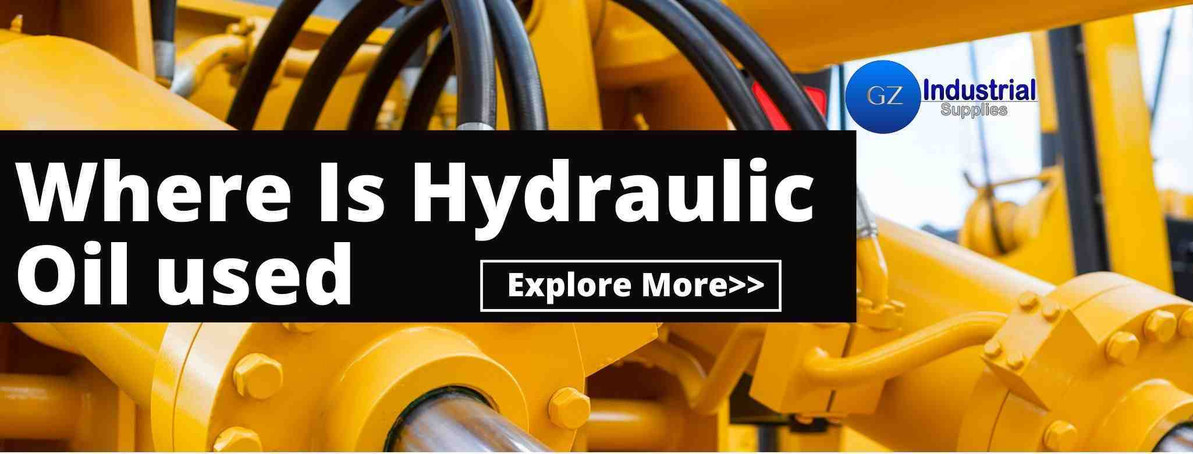Where Is Hydraulic Oil used
Where Is Hydraulic Oil used
Hydraulic oil is a non-compressible fluid that is used to transfer power within hydraulic machinery and equipment. It is also a fluid found within a piece of equipment that is used to transmit power within that equipment which is generally driven by a pump. It is also used to keep the equipment cool, lubricated, and also carry other contaminants. Hydraulic oil can be synthetic- or mineral-based.
Common hydraulic fluids are based on mineral oil or water. Examples of equipment that might use hydraulic fluids are excavators and backhoes, hydraulic brakes, power steering systems, transmissions, garbage trucks, aircraft flight control systems, lifts, and industrial machinery. Hydraulic systems like the ones mentioned above will work most efficiently if the hydraulic fluid used has zero compressibility.
In this section, GZ-supplies offer a variety of hydraulic fluids for use in hydraulic systems that operate in a variety of operations and environments.
GZ-Supplies helps to refine your hydraulic oil requirement based on such things as whether the hydraulic system is used in cold climates? Could there be an environmental impact if there was a leak? Is the hydraulic system operating around food products? or does it conduct electricity? Getting you the correct hydraulic oil based on your particular application ensures the best performance and equipment life.
Where Is Hydraulic Oil Used.
Whether your hydraulic system is in a car, a lift, a plane, or cruise ship, there is a magical elixir of mineral oils, glycols, esters, and additives to fit the situation. Hydraulic oils are used for many mechanical purposes that include high pressure, extreme temperature, and heavy-duty applications.
Automotive Braking systems rely on hydraulic fluid to smoothly bring your car to a stop. Brake fluid, a specialized type of hydraulic fluid has a high boiling point which makes it more appropriate for the heat-producing function of braking a car, motorcycle, truck, and even some bikes. These hydraulic fluids are mostly made of glycol ethers or refined mineral oils.
Heavy Machinery Bulldozers, excavators, cranes, tractors, and lifts, use hydraulic systems to create enough force to move materials and equipment. Many of these systems employ hydraulic cylinders that transfer power through the hydraulic oil between cylinders, often with the assistance of motors. When high-pressure, heavy load conditions are present, a fluid with a higher viscosity grade and anti-wear additives work the best. For plows and applications that operate in extremely cold temperatures, antifreeze additives are also considered.
Aviation: Hydraulic oils used in aviation or aerospace applications must fulfill a host of different demands because they come into contact with a wider range of environments. A high viscosity index, low-temperature properties for high altitudes, and oxidation resistant additives make the oil more reliable for such a demanding industry. Aviation-specific oils are used for flight controls, landing gear, brakes, wing movement, and other aircraft hydraulic motors and pumps.
Marine Boats and ships require hydraulic oils for maneuvering, and these hydraulic applications include steering systems, bow and stern thrusters, anchor windlasses, and shell doors, among others. Hydraulic oils in the marine industry are often biodegradable due to regulations and the fragile environment in which they operate. It is also necessary that these fluids are long-lasting and efficient in cold temperatures.
Fire Resistant: Non-mineral oil hydraulic fluids especially water-glycol or phosphate ester synthetics are suitable for moderate operations where it is dangerous to generate too much heat. Military and metal industry applications, die casting machines, and furnace hydraulic systems commonly use these oils to prevent fires.
How Do You Know if You are using the Right Hydraulic Oil?
For most lubricated machines, there are many options when it comes to lubricant selection. Just because a machine will run with a particular product doesn’t mean that product is optimum for the application. Most lubricant misspecifications do not lead to sudden and catastrophic failure; rather, a misspecification shortens the average life of the lubricated components and thus, goes unnoticed. With hydraulics, there are two primary considerations – the viscosity grade and the hydraulic oil type (AW or R&O). These specifications are typically determined by the type of hydraulic pump employed in the system, the operating temperature and the system’s operating pressure.
If the hydraulic fluid viscosity is too low, the oil film will be too thin causing direct metal to metal contact which leads to excessive wear on components. Low viscosity fluids also increase the risk of internal leakages generating a lower volumetric efficiency of pumps and motors. If the fluid viscosity is too high, the system will suffer from a sluggish movement and a reduced mechanical efficiency.
This generates energy losses and unnecessary heat generation. Other negative effects of a high fluid viscosity are cavitation, poor air release and inadequate lubrication. The HF viscosity is influenced by ambient and operating temperature and system design. High temperatures result in lower viscosity and vice versa. Choosing a hydraulic fluid with the right viscosity is primordial for the overall efficiency of the hydraulic system. The fluid viscosity determines both the mechanical efficiency and the volumetric efficiency and sets the limits of the optimum operating range of a hydraulic system.
Three common varieties of hydraulic fluids found on the market today are petroleum-based, water-based and synthetics.
A synthetic fluid is a man-made chain of molecules that are precisely arranged to provide excellent fluid stability, lubricity and other performance-enhancing characteristics. These fluids are great choices where high or low temperatures are present and/or high pressures are required. There are some disadvantages to these fluids, including high cost, toxicity and potential incompatibility with certain seal materials.
A petroleum fluid is a more common fluid and is made from refining crude to a desired level to achieve better lubricant performance with the inclusion of additives, which range from anti-wear (AW), rust and oxidation inhibitors (RO) and viscosity index (VI) improvers. These fluids offer a lower-cost alternative to synthetics and can be very comparable in performance when certain additive packages are included.
Water-based fluids are the least common of the fluid types. These fluids are typically needed where there is a high probability of fire. They are more expensive than petroleum but less expensive than synthetics. While they offer good protection for fire, they lack wear protection abilities.
In conclusion, hydraulic fluid is the life-blood of many mobile and stationary machines. It is difficult to overemphasize the care that should be taken to maintain this precious medium. It is equally important to remember that while a quality fluid has been engineered and designed to perform challenging tasks, it cannot compensate for a system with an undersized reservoir or a motor with an excessive shaft load. If the hydraulic components are properly specified and the overall system is well designed, a good quality hydraulic fluid will serve the critical function that ties the pump and the actuator together, along with all components in between.
For more information about hydraulic oil or where hydraulic oil is used, contact GZ Industrial Supplies Nigeria, we have in stock high quality hydraulic oil and other industrial lubricants that will serve your needs.
Related Articles
Why Use Distilled Water For Inverter Battery
DIFFERENT TYPES OF WATER PUMP AND THEIR APPLICATION
The Best Water Pumps in Nigeria 2023 Reviews
Recent Posts
-
HOW TO RESOLVE WATER PUMP FAILURE
Water pumps are little heroes in our homes but are usually forgotten until we have a problem. As lon …Oct 21, 2024 -
Epoxy vs. Polyurethane Flooring: Which is Best for Your Space?
Key Takeaway Epoxy flooring is highly durable, chemical-resistant, and ideal for industrial and hig …Oct 18, 2024 -
Understanding Cable Types: Applications and Uses in Industry
Key Takeaway Different cable types serve various industrial applications, including power transmi …Oct 18, 2024





